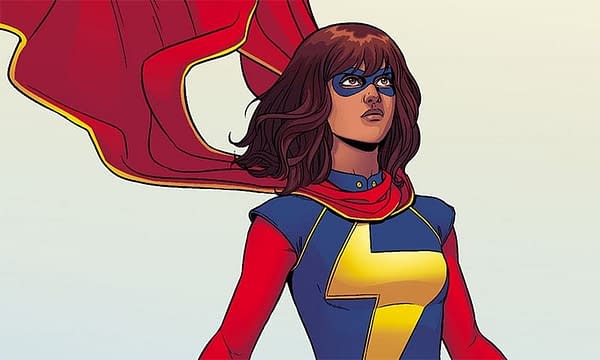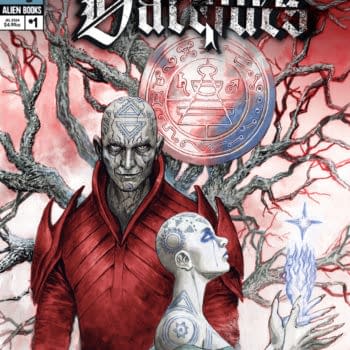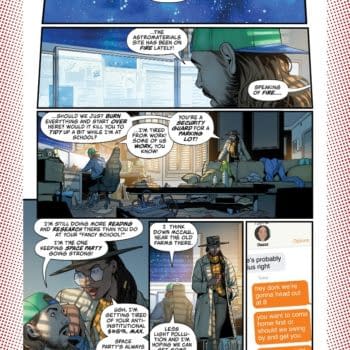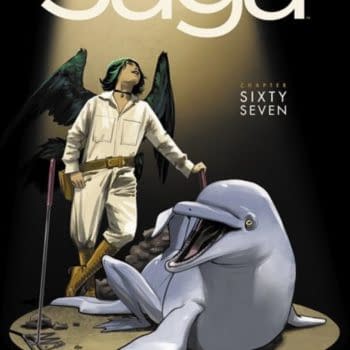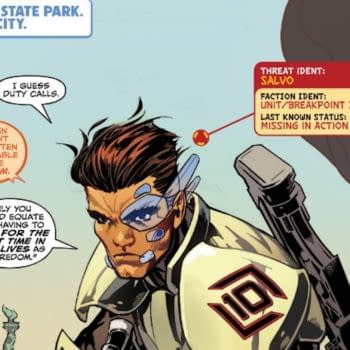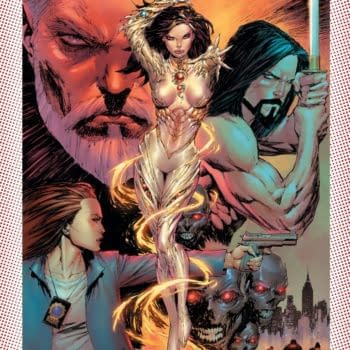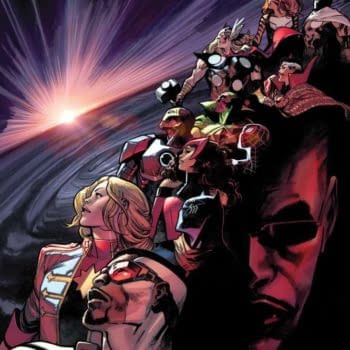Posted in: Comics | Tagged:
When Superheroes Get Social Justice Right, They Really Get It Right – The "Books As Flint" Panel At C2E2
Adam Ebert writes from C2E2,
The Books As Flint: Using Graphic Novels to Spark Political Activism panel included: Anny Rusk (writer/arts advocate), Lys Galati (Pop Culture Publicist), Adan Alvarado (educator), Claire Hotaki (educator), Katie Schenkel (writer/critic), and Sandy King (writer/producer).
Eric Kallenborn, of the Comics Education Offensive, started the panel by introducing his organization and their objective to get comics in classrooms across the country. The group has offered over 10 professional development panels for educators over the past two days. Lys Galati began the discussion by noting that teachers have become so much more in recent years, sparking conversations with students and diversifying the media they are putting in front of their students. Adan Alvarado, a teacher, noted that teachers must prepare their students for not only the workplace, but also to be effective members of their community. Any text used in a classroom should spark discussions that have the students examine the world around them.
Claire Hotaki spoke on pairing traditional texts with graphic novels. Her first example was In Cold Blood by Truman Capote and Capote in Kansas by Ande Parks and Chris Samnee. The combination was used as a prompt to make connections between literature and the real world. Rusk spoke on the power of young adult literature and the value it often puts on activism for children at a young and impressionable age. The ideas in these books should be used to have students consider how they can make the world a better place.
Schenkel suggested Bitch Planet as a text to spark discussion, but that might not necessarily be appropriate for most classrooms. She also noted that that book would pair incredibly with The Handmaid's Tale by Margaret Atwood. Bitch Planet single issues also include essays from feminist writers that help contextualize and flesh out the ideas throughout the book. Sandy King noted that the film They Live was a great story for students to examine the culture around them and what is being broadcast to them at any given moment. King also noted that comics can be used for readers to find what is important to them and what they can champion.
Comics that allowed the panelists to see versions of themselves in the story became the next point of discussion. Schenkel noted that the first time she saw herself reflected in a story was A Wrinkle of Time. She read the book at a young age and became incredibly engaged in it as she read the night before her family went to Disney World. Katie mentioned that she was more engaged with that text than she was excited for her family's actual vacation. Seeing people like yourself in the stories you read is a gratifying experience and helps us feel that we have a place in the larger world. Alvarado brought up Persepolis as a text that had examine what it meant to be part of multiple cultures and unsure of where you fit into it all. Hotaki brought up Craig Thompson's Blankets, connecting to it as a story of isolation and small town life. The feelings of not fitting in, but also falling in love was incredibly appealing.
The topic of empathy streamed out of that discussion and that there are a great deal of titles that do that in current comics culture. Ms. Marvel was brought up with the example of "Good is not who I am. It's what I do." This was an idea that established that no one, including teachers, is perfect. However, we must strive to do the best we can for the people we find ourselves living with and helping. Alvarado discussed how his classes are having conversations on social activism and how he's educating his students on the best way to enact change. Graphic novels, he noted, were some of the most effective texts to use as the visual medium allowed for immediate engagement and comprehension. Texts like Pride of Baghdad, Yummy, Plutona, and March were mentioned as jumping-off points for conversations that concern issues in our current society.
"Superheroes usually get a bad wrap," said Schenkel, "but when they get social justice right, they really get it right." Engagement can also be very high, based on the nature of the story and the popular characters involved. We Are Robin was a title discussed in that it demonstrated how young people in a community, similar to the Black Lives Matter movement, could enact change, even on a small level. Superhero comics can teach social issues, but teachers must look for the right ones.
"Graphic novels are a way of travelling," noted Anny Rusk, speaking on the nature of comics and literature as a means to explore different cultural viewpoints. "I can have a sense of someone's struggle and then I can get a sense of how to help [them]." She noted that literature is often more truthful than the news or social media, which rang applause from the audience. The Killing Joke by Alan Moore and Brian Bolland was discussed as a classroom text being used to illustrate empathy as students may move to understand the decisions a hero or villain may make.
Lys Galati even noted, "I didn't identify with Batman, I identified with Barbara in the wheelchair. One must be aware of their limitations and find the best opportunities to act." Katie Schenkel praised and suggested The Unbeatable Squirrel Girl, noting coding, empathy, and determination to save the day. "She actually listens to find a solution to beat the bad guys. And if that doesn't work, she'll just punch them." The audience got a good chuckle there. "We can't overstress the importance of horror texts," said Sandy King, discussing the questions of empathy apparent in Mary Shelley's Frankenstein. Students can find themselves through the stories of isolation and allegories that still ring true today.
Learning about personal culture and exploring others was the power of comics, according to Anny Rusk. "It was interesting to learn about not only my culture, but other cultures, through a graphic novel," noted Rusk, speaking on social activism, but also the opportunity for readers and fans alike to take action.



